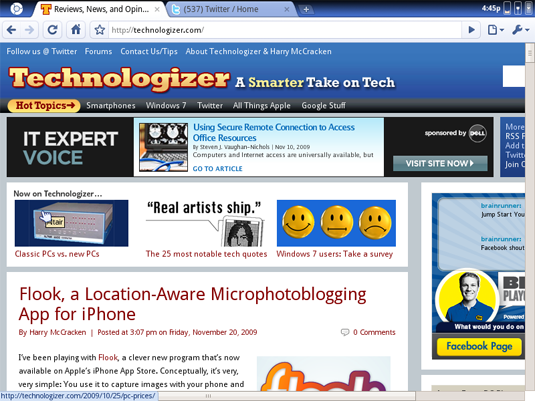Chrome OS: Move Along, Nothing to See Here (Yet)
By Harry McCracken | Friday, November 20, 2009 at 5:17 pm
So I took the plunge and installed Chrome OS on a virtual machine on my Windows 7 laptop. I used Sun’s free VirtualBox virtualization software and the downloadable version of Chrome OS hosted by Gdgt. Actually, when I used the Gdgt download in the form of a VirtualBox image, I couldn’t get it to boot–so I tried again with the VMWare download (also compatible with VirtualBox) and all went well.
Except for one thing: There’s very little reason to check out Chrome OS just now. What you get is a somewhat stale version of the OS that has features that don’t work unless you have an e-mail address at Google. And the version of the OS you get is pretty much Chrome-the-browser with a few differences in terms of window management, plus OS-related fripperies like a battery gauge. And some fripperies are still missing, such as the ability to power down the OS. (Fair enough–at yesterday’s press event, Google warned us that Chrome OS was still subject to lots of change before it shows up on netbooks about a year from now.)
Of course, even in its final form, Chrome OS won’t be much more than a browser with enough underpinnings to qualify as an operating system. That’s the whole idea. But we’ll need something closer to the final version before it’s reasonable to start critiquing the OS. And while a virtual machine is a great way to try Chrome OS with a minimum of hassle, it’s a lousy way to get a sense of what it’ll be like in the real world. You want to run this thing on a machine where it’s your one and only OS, and you can’t cheerfully <Alt><Tab> back into Windows the moment you discover something you can’t do in Chrome. Which is why I’m still intrigued by the idea of getting it up and running on my Asus EeePC 1000HE.
Anyone else out there given Chrome OS a try yet?

9 Comments
Read more:
6 Comments For This Post
3 Trackbacks For This Post
-
Run Chrome OS Like a Native | Technologizer Says:
November 25th, 2009 at 12:22 am[…] all: News Run in a virtualized machine, Google’s Chrome OS feels pretty much like Chrome-the-browser–which makes the whole […]
-
With Technology, Abstraction is Inevitable Says:
January 28th, 2010 at 5:43 pm[…] course, isn’t the only company driving further abstraction of the computing experience. With Chrome OS, for instance, Google is pretty much trying to abstract everything out of the operating system […]
-
with-technology-abstraction-is-inevitable « eonly.us Says:
May 28th, 2010 at 12:32 pm[…] course, isn’t the only company driving further abstraction of the computing experience. With Chrome OS, for instance, Google is pretty much trying to abstract everything out of the operating system […]













November 20th, 2009 at 5:53 pm
I just always assumed “Google OS” was going to be nothing more than a web browser and an interface to Google web applications. Sounds like – so far – that’s accurate.
November 20th, 2009 at 6:08 pm
Sounds a lot like the browser build that surfaced last month. I loaded that up on an old machine and had the same experience — essentially, Chrome, because none of the actual features are working.
November 20th, 2009 at 6:35 pm
I fired it up in VMware Workstation. I’m relieved to know I’m not the only one who couldn’t find the “off” option! 🙂 It is definitely a work in progress, but we’ll have to wait and see how much Google allows to interact with local HW & files (and supports offline usage!). Personally offline use is pretty important.
November 20th, 2009 at 7:05 pm
Was your clock/time right? I was kinda fixated on my time being wrong and no obvious way to force it to sync with some server, somewhere. Maybe I didn’t give it enough time. Perhaps 6 months will be enough to wait it out. 😉
November 20th, 2009 at 7:53 pm
Thanks for doing the work, Harry. I’ll check back in next fall sometime.
November 22nd, 2009 at 2:29 am
Nice review – to the point. I tried it and basically using virtualbox with chrome os it the complicated way of using chrome dev on w7. By the way in my opinion chrome os will fail unless netbooks are sold under $200 but then again, a netbook will still be an inferior notebook/laptop.